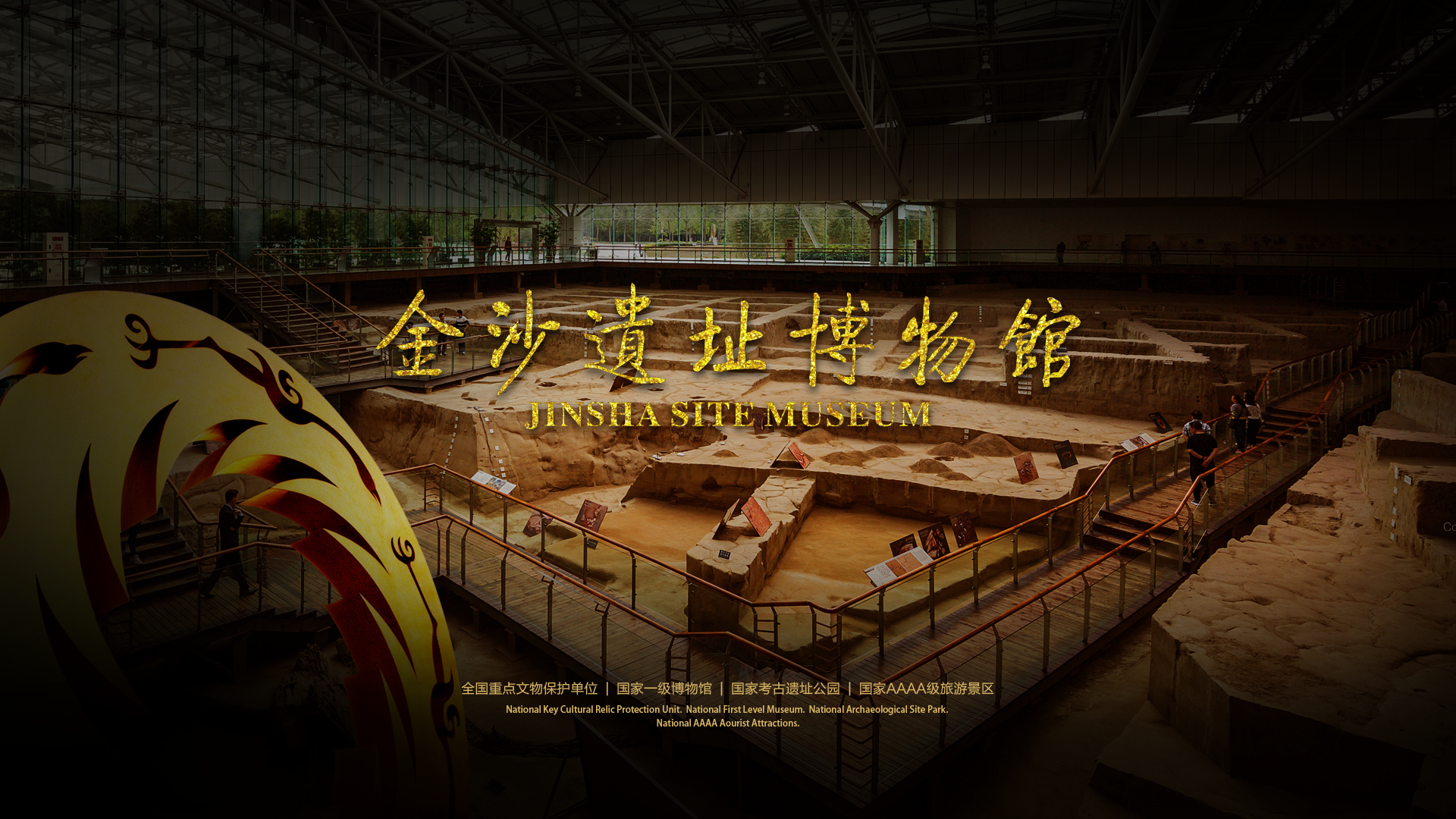Meeting Jinsha in Poems on 5.18 International Museum Day
Release Time: 2017-11-02
Today is 5?18 International Museum Day, museums all over the world will hold various kinds of publicity and commemorative activities to make more people know about museums. Jinsha Site Museum not only opens to public free of charge, but also releases a new poem collection of cultural relics The Tale of Jinsha and holds a reading party to celebrate the day.
Meeting Jinsha in Poems: Convey Jinsha Mythology in Verse

The poem collection of Jinsha cultural relics created by poet Peng Zhiqiang is the first poem collection writing about the ancient Shu civilization, Jinsha Kingdom and the history of Chengdu which has been lost for 500 years. It makes the past history speak again in the way of poetry and tell the production life and sacrificial culture of the ancient Shu people to fill the literary gap for the mysterious history of Jinsha Kingdom.

Today, Jinsha Site Museum held a special release and signings for the poem collection of Jinsha cultural relics The Tale of Jinsha. Children from Jinsha Primary School recited two poems Flower Arriving at the Sun, Start from the Shu with Mask on, and the bright voice of them conveyed the natural and harmonious life of the ancient Shu people and the inner world of “all things have spirit”. Just as the theme of 5?18 International Museum Day this year “Jinsha Museum is dedicated to the sustainable development of the society”, living in harmony with nature is one of the philosophies that Jinsha is transferring and also one of the meanings of the two poems.

At night, the poetry reading party for The Tale of Jinsha of Meeting Jinsha in poems on 5?18 International Museum Day was held in Jinsha Site Museum. Liang Ping, Li Boqing, Ouyang Fenqiang and other literary celebrities came to Jinsha reciting poems in The Tale of Jinsha. The famous writer A Lai and the playwright Wei Minglun also went to the scene, listening and sharing their feelings about the poems in this collection. Romantic lines contain a timeless charm, unconstrained imagination makes people fascinated in the ancient Shu Kingdom three thousand years ago. Poetry Chief Editor of The Star Liang Ping has commented: “The dazzling ancient Shu civilization three thousand years ago was witnessed by cultural relics in the past and is depicted in poems now.”
When talking about creative motive, author of The Tale of Jinsha Peng Zhiqiang said earnestly, “Jinsha itself is a mythology. The first is that Jinsha Ruins became the first major archaeological discovery in early twenty-first century of China. Then the unearthed Gold-leaf Sunbird became the symbol of China cultural heritage, and now the city logo of Chengdu. This poem collection aims to convey Jinsha mythology via poems, the mythology that ancient Shu people created in this mysterious city of Shu at latitude 30°41’ north.”
Cultural relic expert Wang Yi: This book fills the literary blank of the ancient Shu history- Jinsha Civilization
The reporter also interviewed the curator of Chengdu Jinsha Site Museum Wang Yi. As an authority of domestic cultural relic archaeology, he believes that the book fills the literature blank of Jinsha civilization in ancient Shu history. “This year is just the 10th anniversary since Jinsha Ruins unearthed cultural relic ‘The Sun Bird’ was awarded China Cultural Heritage symbol. Cultural relic is the bridge of communication between the public and the museum. Studying the ancient Shu culture for many years, the Chengdu young poet Peng Zhiqiang released the Jinsha cultural relics poetry collection this year not only to provide a new variety of poetry-cultural relic poetry for Chinese poetic circle, but also to fill the literature blank for the ancient Shu history that has been lost for hundreds of years. Therefore, on May 18th, this year’s International Museum Day when we open free of charge to the public, we hold the special and grand poetry reading party for The Tale of Jinsha for more people to know the birthplace of the symbol of China cultural heritage, and cultural relics here are not only high-end as the Sun Bird carrying Shenzhou VI spacecraft into outer space, also very down to earth for letting the cultural relics having communication and dialogue with the audience.”
The Mao Dun Literary Prize winner A Lai Prefaces: Good poetry should be shared to everyone.
We are given to understand that it is the famous writer, chairman of the Sichuan Provincial Writers Association and the fifth Mao Dun Literary Prize winner A Lai who writes prefaces for poetry collection by Peng Zhiqiang The Tale of Jinsha. Speaking of Peng Zhiqiang's poetry, A Lai commented, “The breeze-like words and endless imagination open a totally new window for me to understand Chengdu history, the ancient Shu civilization, and ancient Jinsha people's life and sacrifice. In my view, it creates a fantastic magnetic field for me: it is a kind of dialogue voice between a poet and cultural relics, a resonance between poetry and cultural relics. Facing these poems of cultural relics, I seem to have entered a new ancient Shu Kingdom. I think the meaning of those precious cultural relics preserved is exactly a powerful reminder: remind us of the emotional and spiritual inner meaning; remind us of the civilization root of human and some ethnic groups. The poet Peng Zhiqiang makes a deep dialogue with the cultural relics depicted in his poems. What is not such a dialogue between readers and the poets? Good poems should be shared with all of us.”
Coincidentally, the Poetry Chief Editor Liang Ping of domestic literary journal The Star, the quickly rising female poet Yu Xiuhua and the famous poet and poetry critic Shen Haobo also make high evaluations on The Tale of Jinsha. Shen Haobo said, “Peng Zhiqiang’s poems are created in enticement. In a moment, he is not a speaker, but the history itself, difficult to tell fancy and fact, being and non-being, and a world named Jinsha is just born again from the deep mind.” Yu Xiuhua said, “Peng Zhiqiang brings things back through his own feelings about life by giving them new life and temperature. This is a very good thing because in this way poetry has one more function: let the past to speak again. Their voice may be weak, but reliable, for in which there are at least one person's body temperature and sentiment.”
From the musical drama Jinsha to string quartet Jinsha?Seeking Soul, from the 4D film The Dream of Jinsha to the animation movie The Dream of Jinsha City, from the history and science fiction Blood Sacrifice to the cultural relics poem collection The Tale of Jinsha……These rich artistic forms make Jinsha culture no longer being silent cultural relics and remains. Ancient cultural heritage of Jinsha is no longer an ivory tower thing, but becomes alive and turns into a variety of art forms. People can learn about Jinsha and “read” it by any means they would like.
`About the Author`
Peng Zhiqiang, male, born in Sichuan Nanchong in 1977, graduated from the Sichuan Normal University College of Literature, now settles in Chengdu and works as a signed writer of Chengdu Academy of Art. In 1994, he began poetry creation and returned in 2014 after a break in 2000. During the university, he founded the University Student Newspaper and served as the chief editor of the Pacific, a literature journal and the head of the Literary Society. He also spared sometime as the responsible editor of Sichuan Literature and the special editor of Youth Writers. His poems, proses and novels were published on the Stars, Sichuan Literature and Youth Writers for thousands. In May 2015, his first poetry anthology Words about Jinsha was published. (Sichuan People’s Publishing House).
`New Book`
Words about Jinsha
By Peng Zhiqiang
Sichuan People’s Publishing House (May 2015)
The poetry anthology Words about Jinsha cost Peng Zhiqiang, the write, one year. It is the first book describing the ancient Shu civilization, Jinsha Kingdom and the history of Chengdu with 500 years missing. It is a book telling the past and present of the over 100 cultural relics in the Museum. Highly capable of imagination, Peng retold us the stories of those representative cultural relics unearthed from the Jinsha Site and the production, life and sacrificing culture of ancient Shu people, including the Sun Bird, the Gold Mask, round gold wares, the Gold Human Face, the Jade Cong of Ten Sections, the Collared Jade Bi, the Jade Spear, the Jade Dagger-axe, the Jade Yue, the Bronze Yue, the Bronze Dagger-axe, the Bronze Eyes, the Bronze Collared Bi with Handles, the Bronze Bird, the Bronze Tiger, the Bronze Standing Figure, the Bronze Square Implement, the Stone Resonator, the Stone Pestle, the Stone Axe, the Stone Soft-shelled Turtle, the Stone Knee Sitting Figure, the Bone Dagger, the Bone Awl, the Wooden Si, the Pottery Flat-bottom Pot, the tortoise-shell used to practice divination, the ebony and the ivory. He travelled between history and reality, brought life and warmth to each piece of cultural relics, and made up the gap of the mysterious history of Chengdu.






